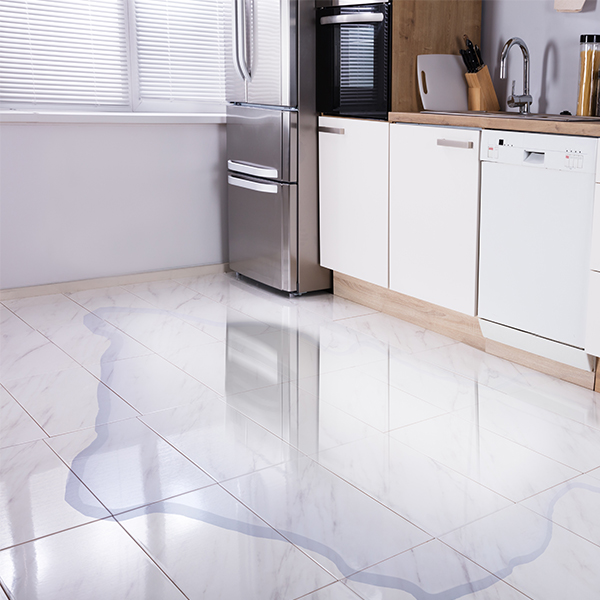
Leaking Refrigerator
Puddle Trouble
A puddle discovered by the refrigerator can mean only one of two things…an ice cube or two that may have fallen and melted, or worse, a leak. Thankfully, there are only a few common causes of refrigerator leaks and they can be checked in a quick process of elimination.
One of the most common types of leaks begins within the refrigerator itself and is caused by a clogged defrost drain. Defrost drains collect the condensation from the water that runs from the freezer’s refrigeration lines down into the drain pan. The water collected in the pan is usually able to evaporate before the next defrost cycle is run automatically by the refrigerator. However, if the drain becomes clogged by food particles or other debris, the water will back up in the freezer, make its way into the fridge, and end up as a puddle on the floor. Clearing the drain by flushing hot water through it and scrubbing it clean with a small brush should solve this problem. And although it’s not common, occasionally the drain pan at the bottom of the refrigerator can develop a crack, allowing the water to leak to the floor as well and causing water damage.
Refrigerator leaks can also be caused by faulty water supply lines, and these are usually the cause of the more substantial leaks you may encounter. Water damage caused by faulty water supply lines can cause severe water damage to floors, ceilings, walls, cabinets, and property. Refrigerators with an ice maker get the necessary water through a ¼-inch plastic tube usually routed from the same water line as the kitchen sink. The hose connects to the back exterior of the refrigerator with a screw-on connection. This connection may become loose over time, causing water to drip or seep down the back of the fridge. The plastic hose itself may also become kinked—putting unwanted pressure on the connection and causing a leak— or the hose may develop a crack over time as it ages, leading to larger but more obvious leakage. If either of these appears to be the culprit, immediately shut off the water supply to stop the flow of water and replace the connection for a tight seal or the hose, making sure the hose doesn’t get bent unnaturally when the refrigerator is pushed back up against the wall.
Occasionally, the water supply line may also freeze, affecting ice production in the ice maker and slowing or stopping water flow from the dispenser while causing water to pool beneath the refrigerator. This problem can be remedied by unplugging the refrigerator and shutting off the water supply valve. Leave the refrigerator unplugged for about two hours to allow any ice in the hose to melt so that water can travel freely through the tube. If anything other than translucent ice appears to have clogged in the hose, consult a professional before trying to remove the clog yourself.
Because even a small amount of sitting water can lead to major damage over time, it’s smart to regularly check your refrigerator for small leaks or drips. Call us if you’ve experienced water damage due to a leaking refrigerator. We can help get your life back to normal quickly and minimize damage.
We provide a FREE evaluation of your water leak damage and work directly with your insurance.
Water Extraction Experts specialize in water damage restoration, sewage cleanup, mold removal, fire & smoke damage restoration, flood damage cleanup. We have 3 locations to serve you.
EMERGENCY 24/7 WATER DAMAGE
CALL: 970-581-4498 Northern Colorado
CALL: 307-220-5900 Southeastern Wyoming
CALL: 505-250-6500 Albuquerque and Santa Fe, New Mexico Areas
